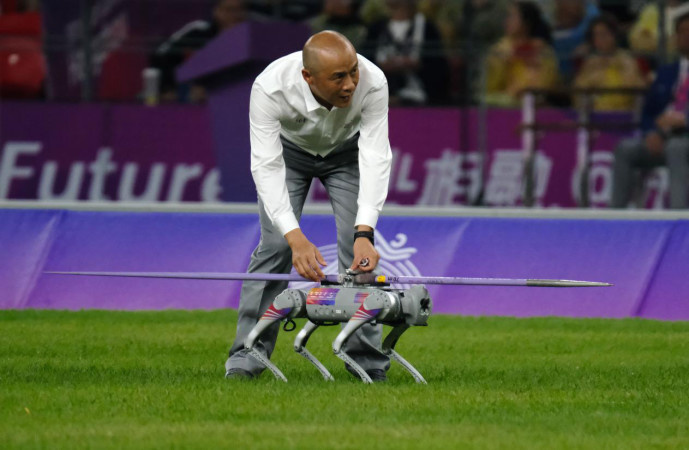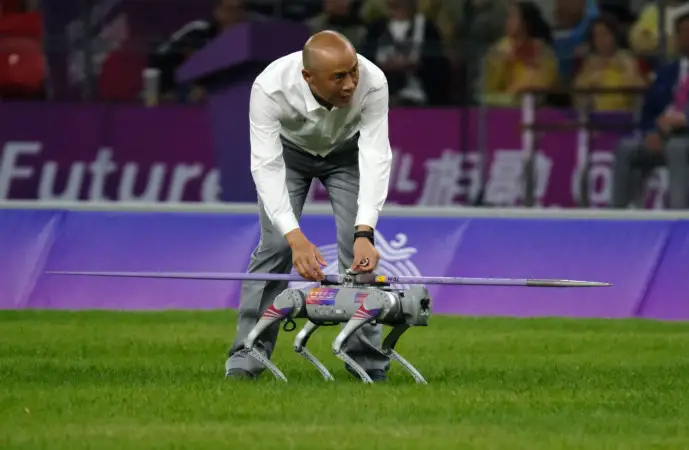By Wang Hailin, People's Daily

A "robot dog" transports a javelin during a javelin competition of the Hangzhou Asian Games, Oct. 3, 2023. (Photo by Wu Huang/People's Daily Online)
At the track and field events of the Hangzhou Asian Games, people's attention was drawn to several "robot dogs" handling discus and javelin back and forth. After completing their assigned tasks of transporting equipment, these four-legged machines would wait obediently at the sidelines for their next commands.
These "robot dogs" are also known as quadruped robots. Shen Hongbin, a Chinese technology officer of the competition department of the Hangzhou Asian Games Organizing Committee, said using "robot dogs" to transport sports equipment like discuses and javelins could greatly save manpower and ensure safety.
Intelligence was one of the key concepts of the Hangzhou Asian Games, and the "robot dogs" used in track and field events exactly embodied the vision of a smart Asian Games.
At the Hangzhou Asian Games Village, passengers lined up early at an augmented reality (AR) bus demonstration area. Buses there employed visual perception, laser radar perception, and other technologies to operate, without the intervention of a safety personnel. Those buses could predict pedestrian and vehicle movements, automatically planning and executing avoidance programs.
With the on-board AR function, passengers could not only see real-time scenes outside the bus when observing through the window, but also view virtual scenarios such as the mascots and sports events. This created a magical fusion of virtual reality with real-life scenes.
From debuting a digital torchbearer to introducing electronic ID registration, and to exploring 5.5G technology, the use of digital technologies and technical innovations at the Hangzhou Asian Games has helped break through the limitations of time and space, allowing more people to participate in the sports events virtually and fully enjoy the excitement of sports.
These "robot dogs" are also known as quadruped robots. Shen Hongbin, a Chinese technology officer of the competition department of the Hangzhou Asian Games Organizing Committee, said using "robot dogs" to transport sports equipment like discuses and javelins could greatly save manpower and ensure safety.
Intelligence was one of the key concepts of the Hangzhou Asian Games, and the "robot dogs" used in track and field events exactly embodied the vision of a smart Asian Games.
At the Hangzhou Asian Games Village, passengers lined up early at an augmented reality (AR) bus demonstration area. Buses there employed visual perception, laser radar perception, and other technologies to operate, without the intervention of a safety personnel. Those buses could predict pedestrian and vehicle movements, automatically planning and executing avoidance programs.
With the on-board AR function, passengers could not only see real-time scenes outside the bus when observing through the window, but also view virtual scenarios such as the mascots and sports events. This created a magical fusion of virtual reality with real-life scenes.
From debuting a digital torchbearer to introducing electronic ID registration, and to exploring 5.5G technology, the use of digital technologies and technical innovations at the Hangzhou Asian Games has helped break through the limitations of time and space, allowing more people to participate in the sports events virtually and fully enjoy the excitement of sports.
 Menu
Menu
 Intelligent technology at Hangzhou Asian Games
Intelligent technology at Hangzhou Asian Games
















